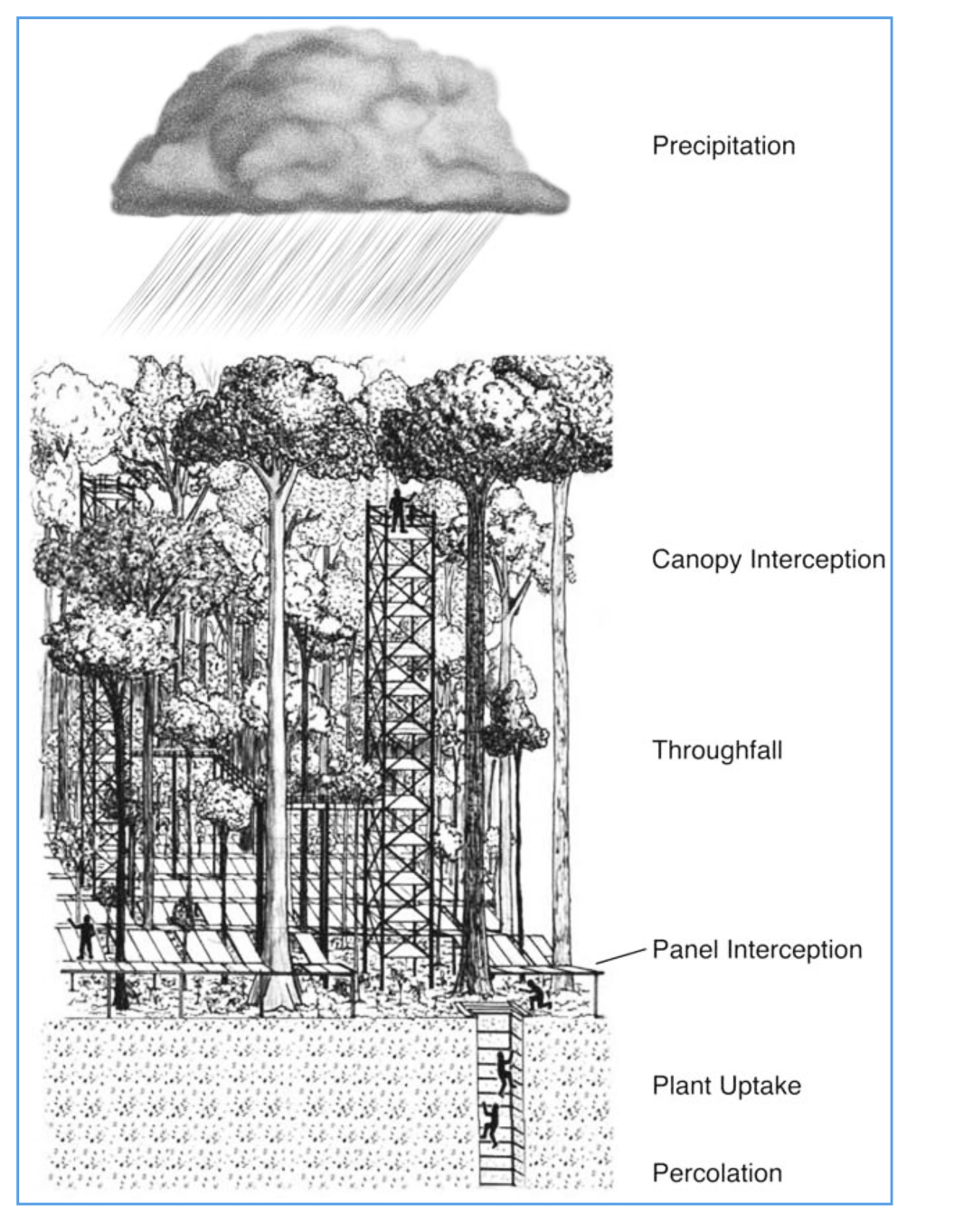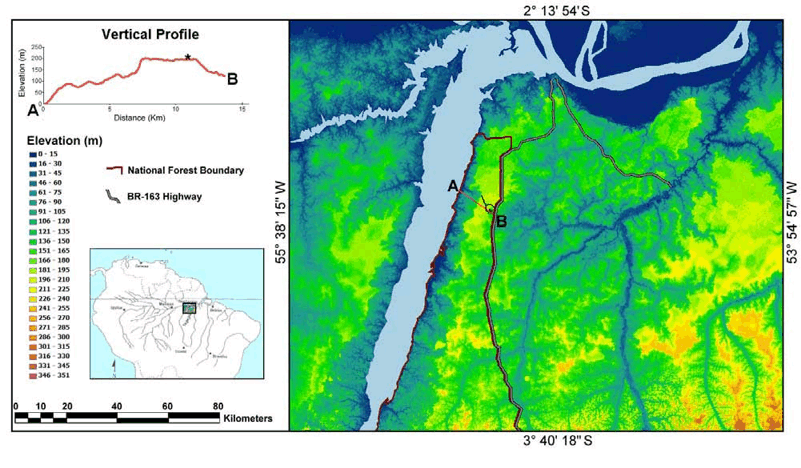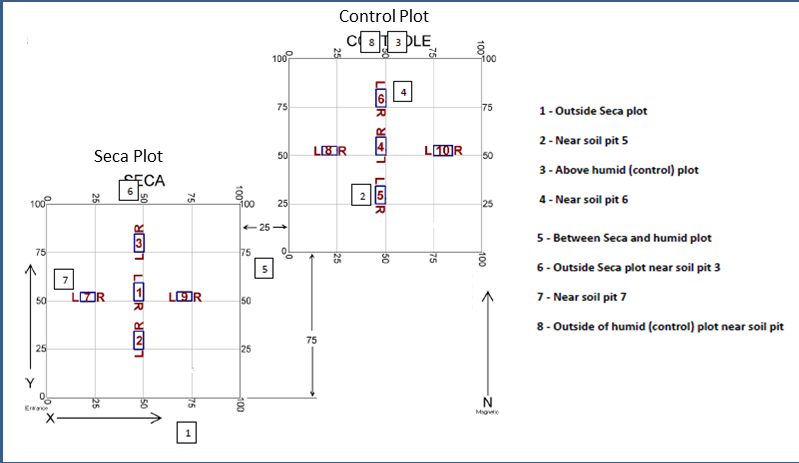Get Data
Revision date: March 26, 2012
Summary
This data set reports field estimated saturated
hydraulic conductivity measurements from June 12 through June 20, 2001. This study was part of a rainfall
exclusion experiment that was conducted from 1999-2001 at the km 67 Seca Floresta
site, Tapajos National Forest, Para, Brazil. The objective of this component
of the study was to develop an understanding of the physical processes
driving the observed soil water dynamics at the site. There is one
comma-delimited ASCII data file with this data set.
Figure 1. Idealized model structure for water cycling in a deep Oxisol. Drawn by Kemel Bittencourt Kalif. From Belk et al. 2007.
Data Citation:
Cite this data set as follows:
Belk, E.L. and D. Markewitz. 2012.LBA-ECO ND-02 Saturated Soil Hydraulic Conductivity, Tapajos National Forest, Brazil. Data set. Available on-line [http://daac.ornl.gov] from Oak Ridge National Laboratory Distributed Active Archive Center, Oak Ridge, Tennessee, U.S.A. http://dx.doi.org/10.3334/ORNLDAAC/1075
Implementation of the LBA Data and Publication Policy by Data Users:
The LBA Data and Publication Policy [http://daac.ornl.gov/LBA/lba_data_policy.html] is in effect for a period of five (5) years from the date of archiving and should be followed by data users who have obtained LBA data sets from the ORNL DAAC. Users who download LBA data in the five years after data have been archived must contact the investigators who collected the data, per provisions 6 and 7 in the Policy.
This data set was archived in March of 2012. Users who download the data between March 2012 and February 2017 must comply with the LBA Data and Publication Policy.
Data users should use the Investigator contact information in this document to communicate with the data provider. Alternatively, the LBA website [http://lba.inpa.gov.br/lba/] in Brazil will have current contact information.
Data users should use the Data Set Citation and other applicable references provided in this document to acknowledge use of the data.
Table of Contents:
- 1 Data Set Overview
- 2 Data Characteristics
- 3 Applications and Derivation
- 4 Quality Assessment
- 5 Acquisition Materials and Methods
- 6 Data Access
- 7 References
1. Data Set Overview:
Project: LBA-ECO
Activity: Modeling the Biogeochemical System of the Terrestrial Amazon
LBA Science Component: Nutrient Dynamics
Team ID: ND-02 (Davidson / Stone / Markewitz / Carvalho / Sa / Vieira / Moutinho / Figueiredo)
The investigators were Davidson, Eric A.; Markewitz, Daniel; Stone, Thomas A.; Carvalho, Claudio Jose Reis de; Figueiredo, Ricardo de Oliveira; Moutinho, Paulo Roberto de Souza; Sa, Tatiana Deane De Abreu; Vieira, Ima Celia G.; Almeida, Arlete Silva de; Araujo, Thereza Cristina; Bastos, Therezinha Xavier; Coelho, Roberta de Fatima R.; Correa, Jean Michel; Costa, Brenda Magda do Nascimento; Costa, Fabiola Fernandes; Cunha, Ewerton da Silva; Rosa, Maria Beatriz Silva da; Figueiredo, Tenilson Monteiro de; Dutra, Fabio Carneiro; Freire, Georgia Silva; Guerrero, Jose Benito; Guild, Liane S.; Hayashi, Sanae Nogueira; Ishida, Francoise Yoko; Pacheco Jr., Alvaro Castro; Kingerlee, Wendy; Leal, Eliane Constantinov; Leao, Luciene Mota de; Leite, Tania de Sousa; Lobato Jr., Ivan da Costa; Lopes, Leticia Campos; Martins, Jorge Ricardo de Souza; Maues, Bernardo Antonio Rodrigue Antonio; Pacheco, Nilza Araujo; Pantoja, Maria de Jesus Ribeiro; Pedreira, Alessandra Cavalcante; Portela, Gilvane Azevedo; Reis, Marilea Barros; Pantoja, Karina de Fatima Rodrigues; Saba, Renata Tuma; Salimon, Cleber Ibraim; Santos, Elisana Batista; Santos, Maria Tereza Primo dos; Santos Jr., Mario Rosa; Schuler, Marysol A.E.; Serrao, Bruno de Oliveira; Siddique, Ilyas; Silva, Marilia; Silva, Patricio de Souza; Silva, Sabrina Forte e; Silva, Wanderley Rocha da; Souza, Alex Henrique Moreira de; Souza, Cleo Marcelo Araujo; Souza, Karina Christina Neves de and Tancredi, Nicola Saverio Holanda . You may contact Markewitz, Dr. Daniel (dmarke@warnell.uga.edu) .
LBA Data Set Inventory ID: ND02_Soil_hydraulic_Conductivity
This data set reports field estimated saturated hydraulic conductivity measurements from June 12 through June 20, 2001. This study was part of a rainfall exclusion experiment that was conducted from 1999-2001 at the km 67 Seca Floresta site, Tapajos National Forest, Para, Brazil. The objective of this component of the study was to develop an understanding of the physical processes driving the observed soil water dynamics at the site.
Related data sets:
- LBA-ECO ND-02 Soil Volumetric Water Content, Tapajos National Forest, Brazil. (Same rainfall exclusion study, same research location)
- LBA-ECO TG-09 SOIL ISOTOPIC C, N, H2O, AND N2O DATA, TAPAJOS NATIONAL FOREST, BRAZIL (Studies performed during same time frame, same location)
2. Data Characteristics:
Data Description: Field estimated saturated hydraulic conductivity measurements at the Seca-Floresta km 67 site, Santarem, Para, Brazil, 2001. Measurements extend to a depth of 6 meters.
Data are provided as a single comma-delimited ASCII file: ND02_Soil_Hydraulic_Conductivity.csv
| Column | Heading | Units/format | Description |
|---|---|---|---|
| 1 | Date | yyyymmdd | Sample date |
| 2 | Location | Relative location of sampling: Outside Seca plot; Near Soil Pit 5; Above humid plot; Near soil pit 6; Between Seca and humid plot; Outside Seca plot near soil pit 3; Near soil pit 7; and Outside of humid plot near soil pit 6. See Figure 3 | |
| 3 | Depth | cm | Depth of Guelp permeameter in centimeters. Surface indicates surface infiltration ring was utilized and area is 35.2 cm^2. Otherwise depth is depth of auger hole with Guelph tube place at depth |
| 4 | Head_ht | cm | Head height: height of the Guelph permeameter head in centimeters |
| 5 | Reading_num | nn [1…23] | Reading number: number of reading in chronological order (1 to 23) |
| 6 | Minute | mm | Minutes since initiating reading. 0 indicates first reading |
| 7 | Second | ss | Seconds following minutes since initiating reading. 0 indicates first reading |
| 8 | Time_interval | decimal minutes | Time interval: number of minutes (expressed as decimal minutes) elapsed between readings |
| 9 | Water_level | cm | Water level: height of water in centimeters (cm) in inner water column of Guelph |
| 10 | Water_level_change | cm | Water level change: the change in centimeters during elapsed time interval since last reading |
| 11 | Water_level_change_rate | cm/min | Water level change rate: rate of water level change in centimeters per minute (cm/min) -- the difference in water level divided by the time interval since last measurement |
| 12 | R1 | cm/sec | R1: steady-state rate of water change in centimeters per second (cm/sec) estimated from the data |
| 13 | Kfs | cm/sec | Kfs: calculated hydraulic conductivity in centimeters per second (cm/sec) based on the measurement data and the reported constants |
| 14 | Comments | Specific comments about measurements, if provided; otherwise "none" | |
| Note: -9999 indicates missing values where intervals, rates, or saturated hydraulic conductivity could not be calculated. | |||
Example data records:
|
Date,Location,Depth,Head_ht,Reading_num,Minute,Second,Time_interval,Water_level,Water_level_change,Water_level_change_rate,R1,Kfs,Comments 20010612,Outside Seca plot,Surface,5,1,0,0,-9999,2.3,-9999,-9999,-9999,-9999,none 20010612,Outside Seca plot,Surface,5,2,2,0,2,3.4,1.1,0.55,-9999,-9999,none 20010612,Outside Seca plot,Surface,5,3,4,0,2,4.3,0.9,0.45,-9999,-9999,none ... 20010614,Near soil pit 7,Surface,5, 1,0,0, -9999, 18, -9999, -9999, -9999, -9999, none 20010614,Near soil pit 7,Surface,5, 2,0,15, 0.25, 21, 3, 12, -9999, -9999, none 20010614,Near soil pit 7,Surface,5, 3,0,30, 0.25, 23.1, 2.1, 8.4,-9999,-9999,none ... 20010620,Near soil pit 5,300,10,4,30,0,10,25.3,2.6,0.26,-9999,-9999,none 20010620,Near soil pit 5,300,10,5,40,0,10,27.8,2.5,0.25,-9999,-9999,none 20010620,Near soil pit 5,300,10,6,50,0,10,30.3,2.5,0.25,0.00417,0.0003822,none |
Site boundaries: (All latitude and longitude given in decimal degrees)
| Site (Region) | Westernmost Longitude | Easternmost Longitude | Northernmost Latitude | Southernmost Latitude | Geodetic Datum |
|---|---|---|---|---|---|
| Para Western (Santarem) - km 67 Seca-Floresta Site (Para Western (Santarem)) | -55.0000 | -55.0000 | -2.75000 | -2.75000 | World Geodetic System, 1984 (WGS-84) |
Time period:
- The data set covers the period 2001/06/12 to 2001/06/20
- Temporal Resolution: One time sample
Platform/Sensor/Parameters measured include:
- FIELD INVESTIGATION / PERMEAMETER / PERCOLATION
- FIELD INVESTIGATION / TENSION INFILTROMETER / HYDRAULIC CONDUCTIVITY
3. Data Application and Derivation:
Typical application of data:
The Guelph permeameter is used to generate field measures of saturated hydraulic conductivity.
Knowledge of the changes in below-ground storage and partitioning of water enhances our
ability to explain other responses of the forest to drought conditions. By quantifying
how the ecological functions of tropical forests change during prolonged drought, we hope to better understand the changes that may occur during the annual dry season in functions such as rooting depth or leaf shedding and better predict the ability of these forests to tolerate reductions in precipitation associated with land use conversion as well as long-term climate changes. (Belk et al., 2006).
Derivation:
Ksat at surface =(alpha*(G*area*infiltration rate))/(a*(alpha*Height+1)+(depth*alpha)*(3.14159*a))
Ksat at depth= [(0.0041)*(res constant)*(R2)]-[(0.0054)*(res constant)*(R1)]
The following constants were utilized for converting surface measurements to hydraulic conductivity:
alpha=0.12 cm^-1
A=35.44 cm^2
a = 10 cm
H1=7.5 cm
G= 0.158
d= 5 cm
The well head height was estimated as WHH=(7.5-I)+WHS where:
I=insertion depth of cutting ring (=5 cm)
WHS=well head scale value (=5 cm). As such well head height = 7.5 cm.
Saturated hydraulic conductivity was calculated for the surface as:
Kfs = alpha*(G*A*R1)/a*(alpha*H1+1)+(G*alpha)*(3.14159*a^2)
For subsurface measurements reservoir constants were:
X=35.44
Y=2.14
Tube constant used=35.44
And saturated hydraulic conductivity was calculated as:
Kfs= [(0.0041)*(tube constant)*(R1 at 10 cm)]-[(0.0054)*(tube constant)*(R1 at 5 cm)]
4. Quality Assessment:
For a few measurements negative Ksat values were obtained, therefore, re-measurements were made and the negative values discarded.
5. Data Acquisition Materials and Methods:
Site Description
To study the response of a humid Amazonian forest to severe drought, a partial throughfall exclusion study was initiated in 1998 in the Tapajo´s National Forest, east-central Amazonia, near Santarem, Brazil (Nepstad et al., 2002). The Seca-Floresta study plots are situated on an upper landscape plateau where the soils support a dense, humid, evergreen forest (terra firme) that does not flood annually. The canopy at this site is horizontally continuous and approximately 30 m tall. Soils are well-drained, predominantly Haplustox (Latasolos vermelhos), dominated by kaolinite clays. The objective of this component of the throughfall reduction study was to develop an understanding of the physical processes driving the observed soil water dynamics at the site.

Figure 2: Site location for the throughfall exclusion experiment in the Tapajos National Forest, Brazil. (Source: Belk et al., 2007).
Experiment Description
This experiment compared two 1-ha plots, one of which received natural rainfall, while the other had plastic panels installed in the forest understory during the rainy season. These panels capture approximately 60 percent of incoming throughfall, channeling the water to a system of gutters and diverting it from the soil. Both the control and exclusion plots were surrounded by a 1.0-1.7 m deep trench, which reduced the ability of trees within the plots to access water from outside the plots (Sternberg et al., 2002). After a 1-year pretreatment measurement period, the plastic panels were installed at the beginning of the 2000 rainy season that extended from January to May. Panels were removed during the dry season and reinstalled prior to the rainy season of the following year. The saturated hydraulic conductivity measurements reported in this data set were taken from June 12-June 20th, 2001.
Saturated hydraulic conductivity (Ks) was quantified using a Guelph permeameter [Soil Moisture Equipment Corporation, 1986]. Seven sets of surface measurements were made at randomly selected locations 1 -7 around the plots using a pressure infiltrometer attachment. Below-ground observations were obtained by augering 6-cm-diameter vertical holes - maximum depth 600 cm. One or two sets of below-ground measurements were completed at each of three sites in the study area. The holes were gently brushed before measurements to remove any smearing of the clays that may have occurred during augering. The steady-state rate of water change in centimeters per second (R1) (cm/sec) was calculated from the data and used to calculate the hydraulic conductivity in centimeters per second (Kfs) (cm/sec) based on the measurement data and the reported constants as described in Section 3.

Figure 3. Surface measurements of steady-state rate of water change in centimeters per second were made at sites 1 - 7. Below-ground observations were made at sites 1, 2, and 4.
6. Data Access:
This data is available through the Oak Ridge National Laboratory (ORNL) Distributed Active Archive Center (DAAC).
Data Archive Center:
Contact for Data Center Access Information:
E-mail: uso@daac.ornl.gov
Telephone: +1 (865) 241-3952
7. References:
Belk, Elizabeth L., Daniel Markewitz, Todd C. Rasmussen, Eduardo J. Maklouf Carvalho, Daniel C. Nepstad, and Eric A. Davidson. 2007. Modeling the effects of throughfall reduction on soil water content in a Brazilian Oxisol under a moist tropical forest. Water Resources Research, Vol. 43, W08432, doi:10.1029/2006WR005493.
Belk, Elizabeth L., Daniel Markewitz, Todd C. Rasmussen, Eduardo J. Maklouf Carvalho, Daniel C. Nepstad, and Eric A. Davidson. 2008. Correction to "Modeling the effects of throughfall reduction on soil water content in a Brazilian Oxisol under a moist tropical forest." Water Resour. Res., 44, W07701, doi:10.1029/2008WR007190.
Davidson, E. A., and S. E. Trumbore (1995), Gas diffusivity and production
of CO2 in deep soils of the eastern Amazon, Tellus, Ser. B, 47, 550–565.
Nepstad, D. C., et al. (2002), The effects of partial throughfall exclusion on canopy processes, aboveground production, and biogeochemistry of an Amazon forest, J. Geophys. Res., 107(D20), 8085, doi:10.1029/
2001JD000360.
Soil Moisture Equipment Corporation, (1986), Guelph permeameter
2800K1 operating instructions, Santa Barbara, Calif.
Sternberg, L. D. S. L., M. Moreira, and D. C. Nepstad (2002), Uptake of water by lateral roots of small trees in an Amazonian tropical forest, Plant Soil, 238, 151 - 158.
Topp, G. C., J. L. Davis, and A. P. Annan (1980), Electromagnetic determination
of soil water content: Measurements in coaxial transmission
lines, Water Resour. Res., 16(3), 574–582.